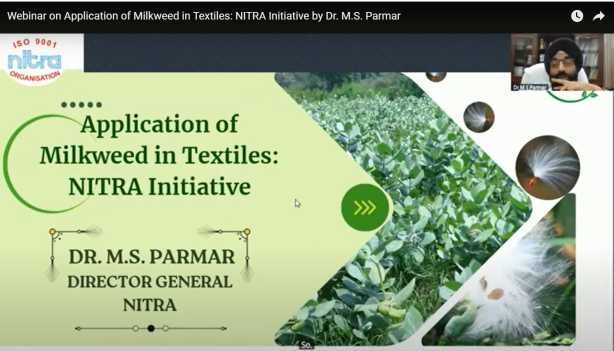NISTI NORTH INDIA SECTION OF THE TEXTILE INSTITUTE JULY 19 2025 WEBINAR APPLICATION OF MILKWEED IN TEXTILES NITRA INITIATIVE DR. M.S. PARMAR DIRECTOR GENERAL SUSTAINABLE TEXTILE INNOVATIONS PROF. NIEN SIAO JS INSTITUTE OF DESIGN TEXTILES FASHI NATIONAL
MUMBAI, MAHARASHTRA, INDIA
By IFAB MEDIA - NEWS BUREAU - July 21, 2025 | 516 4 minutes read
North India Section of The Textile Institute (NISTI) on July 19, 2025, hosted an engaging webinar on “Application of Milkweed in Textiles – NITRA Initiative.”, by Dr. M.S. Parmar, Director General of NITRA. The event drew over 100 participants from across the globe, underscoring the growing interest in sustainable textile innovations.
The session was expertly moderated by Prof. Nien Siao, an esteemed Patron of NISTI and Academic Dean at JS Institute of Design. With her extensive background in textiles, fashion, and crafts, Prof. Siao has been instrumental in NISTI’s initiatives, including conducting competitions and webinars on sustainable practices. Dr. Vijay Yadav, Honorary Secretary and Treasurer of NISTI, opened the proceedings with an insightful overview of NISTI’s mission to advance the textile sector through collaboration between technocrats, industry pioneers, and academia. Chairman Dr. R.A. Lal warmly welcomed the speaker and acknowledged the enthusiastic support from the delegates, highlighting NISTI’s commitment to fostering professionalism and sustainability in the industry. The webinar concluded with a heartfelt vote of thanks from Akhilesh Narain Bajpai, Joint Secretary of NISTI and a freelance textile consultant.
At the heart of the webinar was a compelling presentation by Dr. M.S. Parmar, who explored milkweed fiber’s potential as an eco-friendly alternative to traditional materials. He detailed its unique properties—such as its lightweight, hollow structure, superior thermal insulation, hydrophobicity, and oil absorption capabilities—which surpass those of cotton and polyester in aspects like lower density and higher moisture regain. Dr. Parmar showcased innovative applications, including thermal insulation products like jackets, sleeping bags, and comforters, as well as non-woven bedding, 3D weaving, and hybrid yarns blending milkweed with cotton, silk, or polyester. A standout achievement is the development of a 30-count yarn incorporating 40% milkweed content.
The discussion extended to cultivation and processing, with pilot projects expanding from 2.5 to 10 acres in Uttar Pradesh, Punjab, Haryana, and Rajasthan. Through partnerships with the Cotton Corporation of India, farmers and women have been trained, leading to income opportunities exceeding ₹5,000 per day for participants. A patented harvesting machine and efficient extraction processes further enhance feasibility, while the fiber’s current price of ₹600 per kg (due to inherent R&D cost) is expected to drop with scaled production. Environmentally, milkweed aligns with Sustainable Development Goals, offering new crop options for salty lands and supporting India’s textile export ambitions under the Cotton Productivity Mission.
Attendees actively participated in a Q&A session, addressing topics like cultivation yields, processing costs, safety measures, and plans for expansion to South India, including Tamil Nadu and Karnataka. Exciting proposals emerged for collaborations, such as with NSUT’s Design Department for branding and ICAR for salty land research.
Looking ahead, key next steps include funding from the Ministry of Textiles for product development, ongoing research by the National Botanical Research Institute under their MoU with NITRA, continued farmer training by the Cotton Corporation of India, and NITRA’s initiatives to establish self-help groups, develop fiber standards, and organize training programs on sustainable fibers like milkweed, banana, flax, bamboo, and hemp. Dr. Parmar will provide samples and guidance to interested parties, share presentation slides via email, and follow up with farmers from South India. ICAR will test cultivation on 3-4 acres of salty land, and NISTI will process participation certificates for those who requested them.











